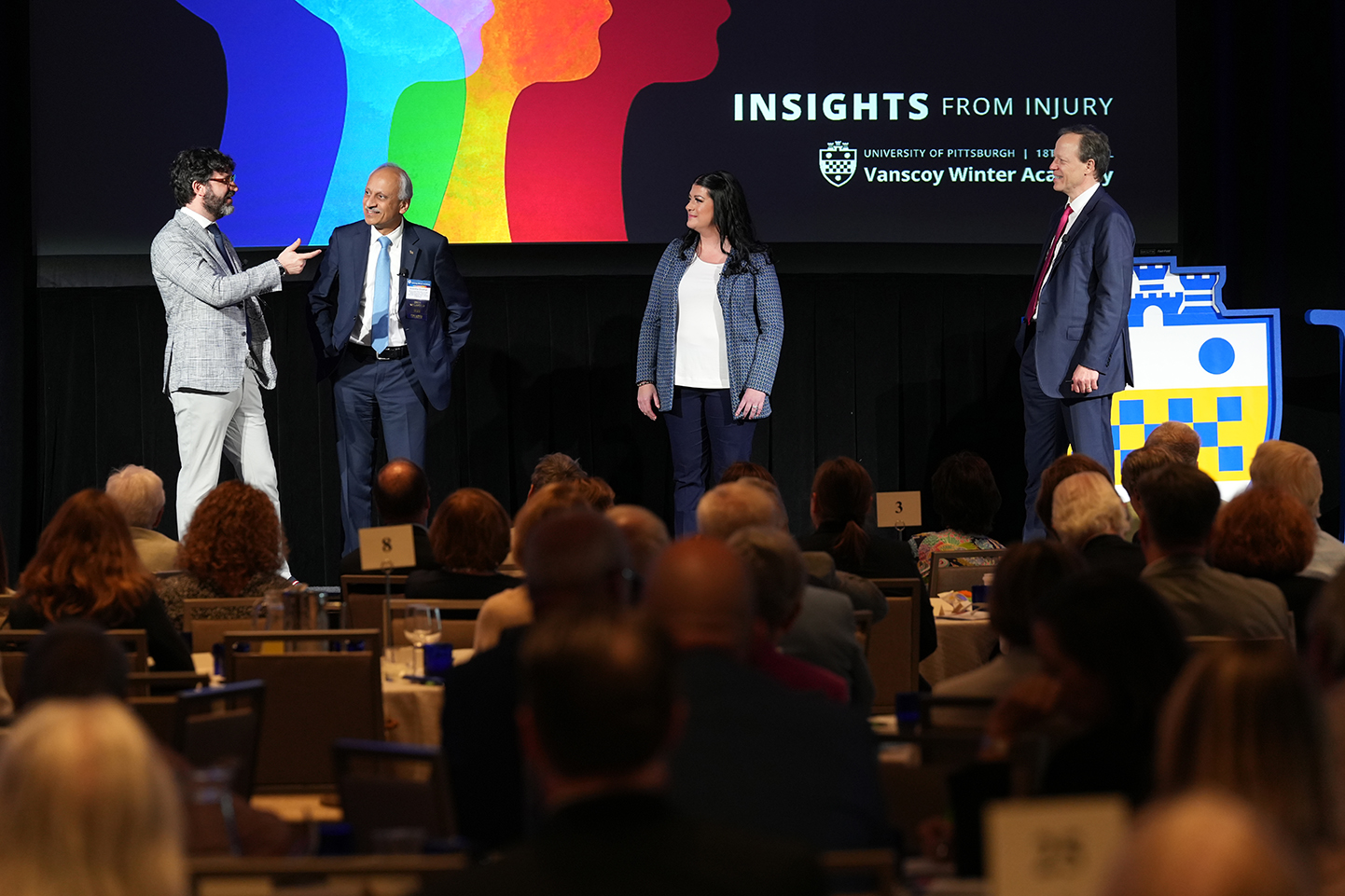
Photo Credit: Eric Wuster, Right Touch Photography
More than 300 alumni and friends of the University of Pittsburgh gathered at Pitt’s 18th annual Vanscoy Winter Academy on Feb. 15 to learn about key insights the medical profession has gleaned from treating and studying brain and spinal cord injuries.
This year’s event, held in Naples, Florida, was themed “Insights from Injury” and featured presentations from Pitt health sciences thought leaders such as Professor of Neurological Surgery David O. Okonkwo, MD, PhD, Professor of Neurology, Psychiatry and Clinical and Translational Sciences Oscar L. Lopez, MD, and Associate Professor of Pathology Julia Kofler, MD.
Author and Pittsburgh native Heather Rendulic joined Walter E. Dandy Distinguished Professor and Chair of Neurological Surgery Robert Friedlander, MD, MA, and Assistant Professor of Neurological Surgery and Director of Spinal Cord Stimulation Laboratory Marco Capogrosso, PhD, to talk about her experience living through multiple strokes that ultimately paralyzed her left side. Thanks to the innovative research in progress at Pitt, Rendulic said, she has regained a significant amount of motor function.
“The brain is the most complex organ in the body, and we are still at a relatively primitive stage of understanding how it works,” said Anantha Shekhar, MD, PhD, senior vice chancellor for the health sciences and John and Gertrude Petersen Dean of the School of Medicine. “Today’s presentations touch on just a small segment of the work we’re engaging in to understand the brain and how to treat related injuries and diseases.”
Research on retaining and restoring brain function
The afternoon-long event began with a session moderated by Clinical Professor of Neurological Surgery and Heindl Scholar in Neuroscience Joseph C. Maroon entitled “Keeping Your Brain Safe—Concussion, TBI and Long-Term Effects.”
Pittsburgh’s medical community is well acquainted with the challenges of treating brain and spine injuries. In fact, Maroon has pioneered elite athletic care for 50 years and was one of the creators of ImPACT (immediate post-concussion assessment and cognitive testing), which can determine safe return to play.
Okonkwo, Lopez, and Kofler touched on ways to maximize and restore brain health, prevent and treat Alzheimer’s disease, and facts and fictions about chronic traumatic encephalopathy.
Okonkwo, who also serves as director of both the Neurotrauma Clinical Trials Center and the scoliosis and spinal deformity program, stressed the importance of not only protecting the brain while athletes are on the field, but also maintaining good overall physical and mental health to keep the brain and body functioning at peak performance. He shared, for example, that due to their weight and size many football players suffer from other conditions such as sleep apnea, which can repeatedly starve the brain of oxygen and result in stroke, heart attacks and a shortened lifespan.
“Brain health can be treated, brain health can be maximized and brain health can be restored,” said Okonkwo. “We’re working hard to bring these solutions over the finish line.”
One such solution shared at the event was a new blood test that will not only accurately diagnose a concussion but will also measure the severity and magnitude of the injury.
“We want to be the institution in the country and the world to bring research all the way to the patient,” said Shekhar. “We are moving not just individual treatments forward, but entire fields of medicine.”
The second half of the event focused on “Restoring Function Post-Stroke” and featured Rendulic, author of “HeadStrong: Through Life, Love, and Brain Surgery,” in conversation with Friedlander and Capogrosso, both of whom have served on Rendulic’s care teams over the years.
After experiencing her first stroke when she was 22 years old, Rendulic was diagnosed with a cerebral cavernous malformation. After she suffered five strokes over the course of just 11 months, Rendulic’s entire left side was left paralyzed.
“I felt like I had a ticking time bomb in my head that could explode at any moment,” said Rendulic.
Friedlander and his team were able to remove the malformations during a nine-hour surgery, which helped to restore a portion of Rendulic’s functionality. Although she retained some physical deficiencies, she relearned to walk, graduated from college with honors, started a new career, published her moving memoir and even walked down the aisle on her wedding day.
Recently, Rendulic served as the first participant in a clinical trial led by Pitt and Carnegie Mellon University scientists to test the effects of spinal cord stimulation on upper extremity weakness. Rather than targeting the brain, electrodes were surgically implanted in the epidural space over the spinal cord through small incisions in Rendulic’s upper back to directly stimulate the motor neurons within the spinal column. With the electrodes in place, electrical pulses worked to stimulate the nerve cells and activate movement—meaning that for the first time in years, Rendulic was able to fully open and close her left fist, lift her arm above her head and perform other daily tasks she thought she would never do again.
About the Vanscoy Winter Academy
During the course of two decades, this event has become an anticipated tradition for the University, drawing hundreds of attendees from across the country each year.
Thanks to a major commitment in 2022 from Gordon J. Vanscoy (PHARM ’84, KGSB ’91) and his wife, Bethann, the event will be held annually in Naples for the next two decades. The Vanscoys’ history of philanthropy to the University includes the creation of a fund to support the Dr. Gordon J. Vanscoy School of Pharmacy White Coat Ceremony, establishment of the Vanscoy Endowed Chair and support for numerous undergraduate and graduate scholarships.
Don’t forget to mark your calendars for next year’s event—the 2025 Vanscoy Winter Academy is planned for Feb. 13. The topic will be Advances in Aging Sciences.
